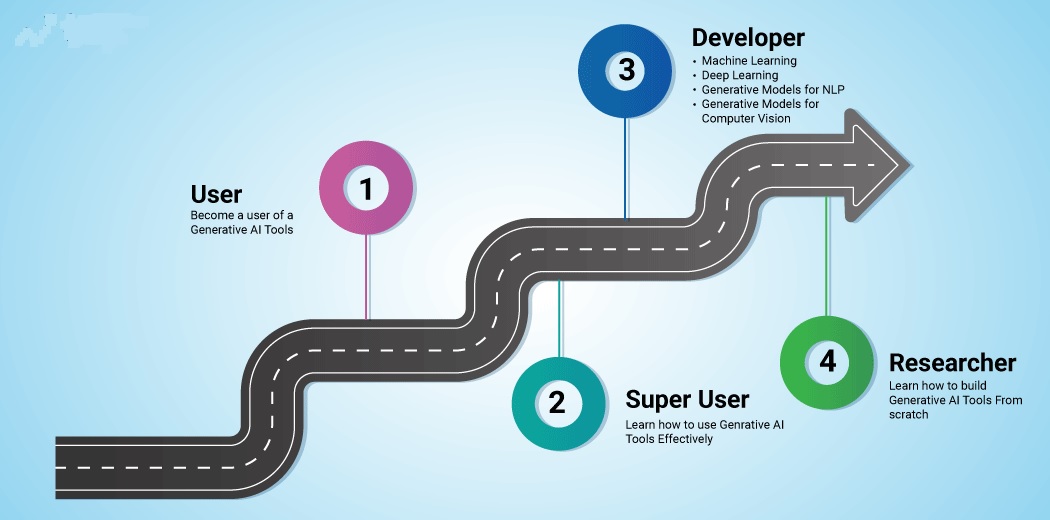The AI Engineer Roadmap: Are you ready to take your Python skills to the next level? Aspiring AI engineers, this is your roadmap! Buckle up as we delve into the fascinating world of advanced Python concepts. From inheritance to multithreading, we’ve got it all covered. Let’s unlock the secrets that will propel you toward AI greatness.

Table of Contents
1. Inheritance: Building on the Shoulders of Giants
Inheritance is like having a magical inheritance vault. Imagine inheriting superpowers from your ancestors! In Python, it allows you to create new classes based on existing ones. You’ll learn how to reuse code, extend functionality, and create hierarchies. Get ready to wield the power of inheritance like a true AI wizard.
2. Generators: The Art of Lazy Computation
Generators are like Python’s espresso shots—compact, efficient, and energizing. They allow you to create iterators on the fly, conserving memory and processing time. We’ll explore generator functions, lazy evaluation, and infinite data streams. By the end of this section, you’ll be sipping your Pythonic espresso with pride.
3. Iterators: Unleashing the Looping Magic
Iterators are your trusty companions on the Python journey. They let you traverse through collections effortlessly. We’ll dive into the __iter__ and next() methods, demystifying how loops work behind the scenes. Say goodbye to manual iteration-Python’s iterators have your back!
4. List Comprehensions: Crafting Concise Code
Why write verbose loops when you can create elegant one-liners? List comprehensions are your secret weapon. They allow you to build lists in a single line, combining loops and conditionals. We’ll explore their syntax, use cases, and how they make your code sparkle. Prepare to dazzle your colleagues with Pythonic brevity.
5. Decorators: Dressing Up Your Functions
Decorators are like tuxedos for your functions-they add flair and sophistication. We’ll unravel the mystery behind @ symbols and learn how decorators enhance function behavior. From logging to memoization, decorators are your toolkit for Python elegance.
6. Multithreading and Multiprocessing: Parallel Universes
AI engineers thrive on efficiency. Multithreading and multiprocessing allow you to harness the power of parallelism. We’ll explore threads, processes, and the GIL (Global Interpreter Lock). Buckle up for a ride through Python’s parallel universes.
Conclusion
Congratulations, AI engineer! You’ve completed the advanced Python roadmap. Now go forth, code fearlessly, and conquer the AI landscape. Remember, the journey is as exciting as the destination. Happy coding! Did you enjoy this blog? Share it with fellow AI enthusiasts and spread the Python love! For more information,so please visit these links.
Learning Resources
1: Iterators, Generators and List Comprehension in Python
2: Advanced Python: Iterators, Generators and Decorators
3: AI Engineer Roadmap 2024 – AI Engineer Roadmap for Beginners … – Studocu
4: Advanced Python Generators: Techniques and Use Cases – codedamn
5: Python List Comprehensions vs Generator Expressions
6: Python Tutorials (Codebasics) on YouTube (17th to 27th video)
Assignments
Finish all these exercises in this same playlist
Write meaningful comments on at least 10 AI related LinkedIn posts
Note down your key learnings from 3 case studies on ThinkSchool and share them with your friend.
Core/Soft Skills
- Start following prominent AI influencers.
- Daliana Liu
- Nitin Aggarwal
- Steve Nouri
- Dhaval Patel
Increase engagement.
Start commenting meaningfully on AI and career-related posts.
Helps network with others working in the industry build connections.
Learning and brainstorming opportunity.
Remember online presence is a new form of resume
Business Fundamentals – Soft Skill
Learn business concepts from ThinkSchool and other Youtube Case Studies
Example: How Amul beat competition:
Discord
Start asking questions and get help from the community. This post shows how to ask questions the right way:
Join code basics discord server
Frequently Asked Questions (FAQs) :The AI Engineer Roadmap: Mastering Advanced Python Concepts
1. What is inheritance in Python, and why is it important for AI engineers?
- Inheritance in Python allows you to create new classes based on existing ones, enabling code reuse, extending functionality, and establishing hierarchies. It’s akin to inheriting superpowers from ancestors, empowering AI engineers to build on existing structures efficiently.
2. How do generators contribute to efficient programming in Python?
- Generators in Python provide a mechanism for lazy computation, enabling the creation of iterators on-the-fly. They conserve memory and processing time by generating values dynamically. Think of them as compact, efficient, and energizing-like Python’s version of espresso shots for AI engineers.
3. What role do iterators play in Python programming, particularly for AI tasks?
- Iterators serve as indispensable tools for traversing through collections effortlessly in Python. By understanding concepts like the
__iter__method andnext()function, AI engineers can streamline processes and bid farewell to manual iteration, leveraging Python’s built-in iterators effectively.
4. How can list comprehensions enhance Python code for AI applications?
- List comprehensions offer a concise and elegant approach to building lists in Python, replacing verbose loops with one-liners. By combining loops and conditionals, AI engineers can craft efficient code that sparkles with Pythonic brevity, impressing colleagues and enhancing readability.
5. What are decorators in Python, and how do they benefit AI development?
- Decorators in Python serve as tools for enhancing function behavior, akin to dressing up functions in tuxedos to add flair and sophistication. Understanding decorators allows AI engineers to implement various functionalities like logging and memoization, contributing to code elegance and efficiency.
6. How do multithreading and multiprocessing contribute to parallelism in Python for AI tasks?
- Multithreading and multiprocessing empower AI engineers to harness the power of parallelism, enhancing efficiency in processing tasks. By exploring threads, processes, and the Global Interpreter Lock (GIL), engineers can navigate Python’s parallel universes to optimize performance and scalability.
7. Where can I find additional resources to deepen my understanding of advanced Python concepts for AI engineering?
- Additional resources such as articles, courses, and case studies are available online to further explore advanced Python concepts for AI engineering. You can refer to sources like Medium, educational platforms like INE, and academic documents like the AI Engineer Roadmap 2024 for comprehensive learning opportunities.
8. How can I enhance my AI-related LinkedIn presence and network effectively?
- Enhancing your AI-related LinkedIn presence involves following prominent influencers, engaging meaningfully with AI and career-related posts, and actively participating in discussions and networking opportunities. By building connections and sharing insights, you can establish a strong online presence conducive to career growth in AI.
9. What soft skills are essential for AI engineers, and how can I develop them?
- Soft skills such as communication, critical thinking, and business acumen are essential for AI engineers. Developing these skills involves learning business concepts, engaging with case studies, and actively participating in communities like Discord to seek guidance, collaborate, and enhance problem-solving abilities.
10. How can I effectively seek help and collaborate within the AI community, particularly on platforms like Discord?
- Seeking help and collaboration within the AI community, especially on platforms like Discord, requires asking questions effectively and engaging with the community respectfully. By following guidelines for asking questions and actively participating in discussions, AI engineers can leverage the collective knowledge and support of the community to advance their skills and projects.

